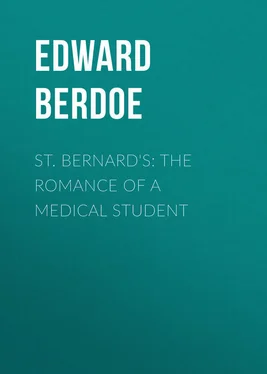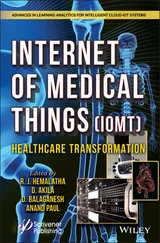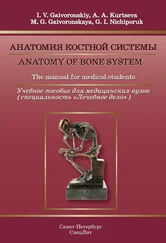Edward Berdoe - St. Bernard's - The Romance of a Medical Student
Здесь есть возможность читать онлайн «Edward Berdoe - St. Bernard's - The Romance of a Medical Student» — ознакомительный отрывок электронной книги совершенно бесплатно, а после прочтения отрывка купить полную версию. В некоторых случаях можно слушать аудио, скачать через торрент в формате fb2 и присутствует краткое содержание. Издательство: Иностранный паблик, Жанр: foreign_antique, foreign_prose, на английском языке. Описание произведения, (предисловие) а так же отзывы посетителей доступны на портале библиотеки ЛибКат.
- Название:St. Bernard's: The Romance of a Medical Student
- Автор:
- Издательство:Иностранный паблик
- Жанр:
- Год:неизвестен
- ISBN:нет данных
- Рейтинг книги:4 / 5. Голосов: 1
-
Избранное:Добавить в избранное
- Отзывы:
-
Ваша оценка:
- 80
- 1
- 2
- 3
- 4
- 5
St. Bernard's: The Romance of a Medical Student: краткое содержание, описание и аннотация
Предлагаем к чтению аннотацию, описание, краткое содержание или предисловие (зависит от того, что написал сам автор книги «St. Bernard's: The Romance of a Medical Student»). Если вы не нашли необходимую информацию о книге — напишите в комментариях, мы постараемся отыскать её.
St. Bernard's: The Romance of a Medical Student — читать онлайн ознакомительный отрывок
Ниже представлен текст книги, разбитый по страницам. Система сохранения места последней прочитанной страницы, позволяет с удобством читать онлайн бесплатно книгу «St. Bernard's: The Romance of a Medical Student», без необходимости каждый раз заново искать на чём Вы остановились. Поставьте закладку, и сможете в любой момент перейти на страницу, на которой закончили чтение.
Интервал:
Закладка:
At all the lectures it was the duty of the beadle and his assistant to occupy a convenient post, in view of the whole auditory, so that he could mark the individual attendance and detect those engaged in larking during the progress of the lecture. Under such circumstances it was a task to the ingenuity of the boys to let off crackers without detection, or shy potatoes and cabbages at the botany lecturer for purposes of classification. The pundits themselves usually took the interruptions in a good-humoured way, doubtless reflecting that medical science has, from immemorial time, been imparted – in the British Isles, at least – under similar difficult conditions; so these being recognised as conditions, they had to yield to the inevitable with the best grace they might. But as they looked to the beadle to keep order by means they knew him to possess, it was incumbent on Mr. Horne, now and then, to “espy” somebody, usually one out of favour with him temporarily, either from being deep in his debt or from having wounded his dignity. When a scape-goat or two had been thus caught, they had to pass an unpleasant quarter of an hour in the private room of the warden, and give assurances of better behaviour under threats of expulsion or suspension of schedules. The patience of the lecturers was admirable; they bore most interruptions with exemplary meekness, but they always resented pea-shooting as disturbing to the exact thinking and speaking necessary in treating scientific subjects. The botany lecturer, indeed, was a pattern of amiability. Not even a potato plump against his snowy shirt front, or a cabbage flop on his manuscript, disturbed him much or drove him into strong language. “Ah, thanks! yes, my young friend, that tuber is the Solanum tuberosum ; it is a good specimen, but a little out of order. We have not yet reached the Solanaceæ . Will the young gentleman who has thus rather roughly drawn my attention to his specimen kindly tell me the characteristics of that order, and name the principal medicinal plants belonging to it? You, sir, I think it was, who forwarded me the example; Mr. – , Mr. – , your name escapes me for the moment. I mean the gentleman with an ecchymosis under his left eye.” The gentleman with the ecchymosis knew as much about the order in question as his bull terrier knew of astronomy; and amid the uproarious laughter of his class-mates, ever ready for a diversion of interest, on being pressed by the lecturer to exhibit his knowledge of the potato tribe, was fain to confess that he knew little more about the species than he saw of them on the dinner-table. He began to wish he had not thrown that tuber, and the laugh was well turned against him as the lecturer scored several neat points in dealing with him. This was one of the recognised and old-established methods of defence adopted by the persecuted teachers, and a good example of the survival of the fittest theory. The chair could really only be held by development of such defence, and the ingenuity of the students in organizing new systems of attack had to be met by improvement in their repulse. It was armour-plating versus guns, and the armour-plating generally saved the ship. Professor Letts would have been a lost man one morning at the chemistry lecture had he not caught the man who threw the lighted squib on the lecture table, where it fizzed and bobbed amongst his neatly fixed-up apparatus for an hour with the gases. “You, sir!” he cried, in his determined, assertive manner that always commanded and secured respect; “you, sir, you squib-thrower, come forward to the black-board! You are going up for your preliminary science; give me the chemical formula for that explosive. We are considering nitrogen this morning; you shall give the audience the benefit of your, doubtless, complete knowledge of your favourite gas. Nitrogen is your favourite gas, is it not, Mr. Albery?” Now poor Albery had to maintain a reputation for chemistry on a very slender basis, and withal was a nervous man; and being all the while unmercifully twitted by Mr. Letts, his symbols got mixed, and he returned to his seat feeling that the squib itself was not more completely “bust up” than he. One of the best retorts was made by the professor of anatomy, who, entering the theatre for lecture one afternoon, found that the skeleton, which always hung on a stand near the lecturer’s table, had been removed from its frame and placed on one of the benches in the auditorium, and was seated in a free and easy manner, with a long clay pipe in its ghastly jaws, and a pewter pot in its left hand. Dr. Hawkes took in the situation at a glance, and said, “Gentlemen, I miss our old friend the skeleton from its accustomed place, and perceive it in a new character seated amongst you. We shall, this afternoon, go on with our remarks on the vertebral column, and I have no doubt my address will be as useful to its empty cranium as it will be to those by which it is surrounded.”
It was many a long day before that trick was played again.
The worst attacks were always made on poor young Dr. Harburne, who held the chair of Materia Medica. He was not equal to dealing with them, and took the matter to heart so much that he soon retired. He was a most able physician, and the more studious of the men did their utmost to repress the disturbances, which were so frequent as to make it impossible for anybody to learn anything or to gain the least benefit from the very valuable course of lectures on this important subject. He often left the theatre, finding it impossible with his meek and gentle manner, and his lack of any power of retort or ability to make reprisals, to continue his address. “Come back, papa,” they would cry; “we are good now!” He knew the ringleaders, but he was too amiable and patient to expose them. “Ah, gentlemen,” he said one day in the lull of a storm of interruption, “the day will come when you will be standing helpless by the bedside of some loved one whom you would give your own lives perhaps to save, and will be powerless by reason of opportunities you are wasting now! I do not envy your reflections then. I pardon you now; your punishment will come later!” Poor fellow! he died in harness, a victim to his long years of hard work in toxicology. In a fit of depression he swallowed prussic acid, just after leaving the profession an exhaustive treatise on its uses!
Such were the lectures at St. Bernard’s, and so passed the time which should have been spent in acquiring information for which the prescribed four years’ course was all too short to gather. No wonder that so many men hold hospital lectures to be almost useless, and attend them no more frequently than they are obliged, when they are generally only occasions of childish amusement. It was not the idle and dissipated who neglected these opportunities – too often these mustered in force for the sake of the fun. It was the best men, who felt that their own rooms and their books could better assist their progress.
Jerry Horne was an accomplished photographer, and used to do many strange and interesting things with his camera. He would get a collection of skeletons from the museum, and arrange them in novel and curious attitudes. One scene was a ball-room, all the dancers being skeletons; another was an inquest, with coroner, witnesses, and jurymen, all skeletons; another an operating theatre, with a skeleton surgeon and assistants, a skeleton patient and spectators. But the favourite subject with the students was the skeleton lecturer, with a skeleton audience larking and otherwise neglecting the business for which they had assembled. The boys bought all these drolleries, and horrified and even appalled their mammas and sisters when they went home, by exhibiting them in a gay and easy manner, thus manifesting their indifference to and contempt of death and the ultimate destiny of man.
Читать дальшеИнтервал:
Закладка:
Похожие книги на «St. Bernard's: The Romance of a Medical Student»
Представляем Вашему вниманию похожие книги на «St. Bernard's: The Romance of a Medical Student» списком для выбора. Мы отобрали схожую по названию и смыслу литературу в надежде предоставить читателям больше вариантов отыскать новые, интересные, ещё непрочитанные произведения.
Обсуждение, отзывы о книге «St. Bernard's: The Romance of a Medical Student» и просто собственные мнения читателей. Оставьте ваши комментарии, напишите, что Вы думаете о произведении, его смысле или главных героях. Укажите что конкретно понравилось, а что нет, и почему Вы так считаете.












